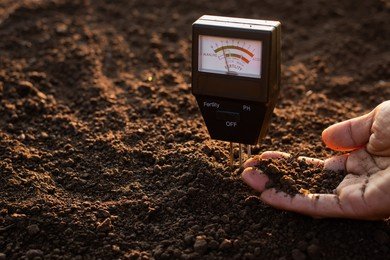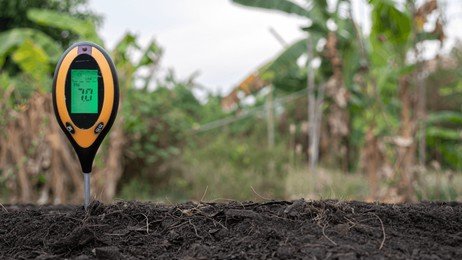A soil moisture sensor is an electronic device designed to measure and monitor the moisture content of soil. It provides essential data about the soil's water content, allowing for more efficient irrigation, better plant management, and water conservation in agriculture, gardening, and landscaping. Soil moisture sensors use various technologies to gauge moisture levels, with some of the common methods including capacitance, resistance, and frequency domain techniques.

How Soil Moisture Sensors Work:
Soil meters are designed to measure the moisture content in the soil. They typically consist of probes or sensors that are inserted into the ground at various depths. These sensors use different methods to measure soil moisture, including capacitance, resistance, or frequency domain techniques.
Capacitance-based sensors measure the dielectric constant of the soil, which changes with moisture content. Resistance-based sensors, on the other hand, use the soil's electrical resistance to estimate moisture levels. Frequency domain sensors measure the soil's response to electromagnetic waves.
These sensors provide real-time data on soil moisture levels, which can be transmitted to a central control system or accessed remotely for monitoring and control.
Application of Soil Moisture Sensors
- Agriculture: Soil moisture sensors are widely used in agriculture to optimize irrigation practices. By measuring soil moisture levels, farmers can efficiently water their crops, reducing water waste and ensuring optimal conditions for plant growth.
- Landscaping: Landscapers and gardeners use soil sensors to maintain healthy lawns, gardens, and landscapes. These sensors help prevent overwatering, which can lead to root rot and other plant diseases.
- Environmental Monitoring: Soil sensors are essential in environmental research and monitoring. They are used to assess soil conditions in natural ecosystems, helping scientists understand the impact of climate change and human activities on soil health.
- Construction: Soil sensors are used in construction projects to assess the compaction and stability of the soil. This information is crucial for building strong and stable structures.
- Sports Fields: Maintaining sports fields, such as soccer pitches and golf courses, requires precise soil moisture control. Soil sensors help groundkeepers keep playing surfaces in top condition.

Significance of Soil Moisture Sensors:
- Water Conservation: Soil moisture sensors help prevent over-irrigation by ensuring that plants receive water only when needed. This conserves water resources and reduces water costs.
- Improved Plant Health: By maintaining optimal soil moisture levels, these sensors contribute to healthier plant growth. Over-watering or under-watering can stress plants and lead to reduced yields or landscaping problems.
- Cost Savings: Efficient water use and reduced energy costs for pumping and distributing water result in financial savings for farmers, landscapers, and homeowners.
- Environmental Benefits: By reducing water usage, soil moisture sensors promote sustainable agriculture and landscaping practices. This helps protect water resources and reduce the environmental impact of irrigation.
- Convenience: Automated irrigation systems that use soil moisture sensors require less manual intervention, saving time and effort for farmers and gardeners.
- Customized Irrigation: Soil moisture sensors allow for precise irrigation scheduling tailored to specific plant and soil requirements. This results in healthier, more productive crops and landscapes.

In conclusion, soil moisture sensors are invaluable tools with a wide range of applications. Whether it's optimizing agricultural practices, conserving water resources, ensuring environmental sustainability, or improving sports fields and landscapes, these sensors have a profound impact. With advances in technology and the integration of data-driven solutions, the future holds even more promise for soil moisture sensors, enabling us to make informed decisions about our environment, agriculture, and infrastructure, ultimately leading to a more sustainable and efficient world. If you are looking for any soil moisture sensors, please feel free to contact us!

